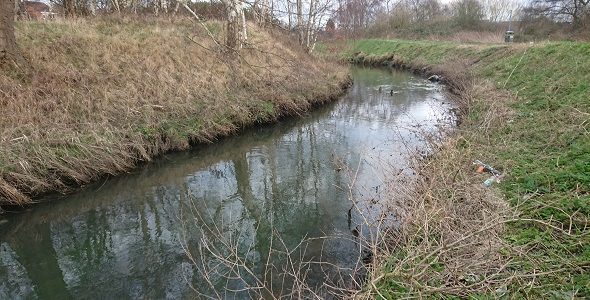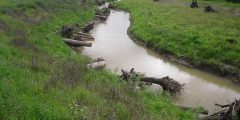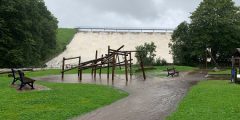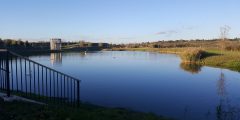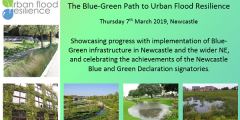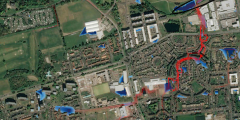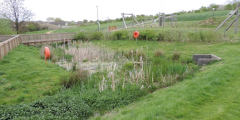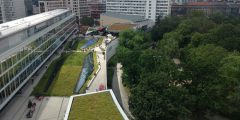Investigating the water quality of the River Leen
June 24, 2021
Hazel Wilson and Charlotte Viner (University of Nottingham) have recently been out and about doing fieldwork in the River Leen. They’ve been investigating the water quality, invertebrates, and habitat quality of the river as it flows through the city of Nottingham. Background information Urban rivers like the River Leen have been heavily impacted by humans …
Upstream Natural Flood Management (NFM) influencing downstream drainage
February 17, 2021
In this blog, Dick Fenner and Charlie Ferguson explore how Natural Flood Management (NFM) strategies in upstream rural parts of a catchment might influence the performance of urban drainage systems further downstream (through moderating water levels in urban watercourses). Catchment-based flood management It is estimated that there will be a general increase of between 5 …
Perspectives on Urban Flood Resilience
February 18, 2020
Dick Fenner (University of Cambridge) introduces the work of the Urban Flood Resilience research consortium that forms a core of papers for a special themed edition of the Royal Society’s Philosophical Transactions A Journal on urban flood resilience, published in February 2020. Details can be found on the special issue homepage. The edition brings together …
Toddbrook Reservoir – A Case of Dam Charity or Charity be Damned?
September 16, 2019
Lessons are being drawn from the near breach of Toddbrook reservoir dam concerning the vulnerability of the UK’s infrastructure to extreme events. Karen Potter reflects on the implications of the risk, liability and responsibility of ‘Toddbrooks’ being devolved to civil society. Flood risk and emergency response On August 1st 2019 approximately 1,500 residents in the …
Urban Flood Resilience team at the ICONHIC2019 (Chania, Greece)
July 22, 2019
Leon Kapetas (University of Cambridge) and Vladimir Krivtsov (Heriot-Watt University) present their highlights of the 2nd International Conference on Natural Hazards & Infrastructure (ICONHIC2019) and post-conference tour of Knossos and its ancient water management system. The conference The Urban Flood Resilience Consortium had the opportunity to present some of their ongoing research at the ICONHIC2019, …
Government’s latest review of sustainable drainage: a box-ticking exercise reinforcing a suboptimal state of affairs?
May 2, 2019
The Ministry of Housing, Communities and Local Government’s (MHCLG) review of current planning policy for sustainable drainage (SuDS) was published in August 2018. Could this exercise have more to do with validating the Government’s current policy approach, rather than an accurate review of the application and effectiveness of planning policy for sustainable drainage systems? Tudor …
The Blue-Green Path to Urban Flood Resilience
April 12, 2019
On 7th March 2019, the Urban Flood Resilience consortium and partners in Newcastle showcased progress with the implementation of Blue-Green Infrastructure (BGI) and shared key findings from the interdisciplinary research project. The 2019 Newcastle Blue and Green Declaration was launched, committing signatories to greater use of multifunctional BGI in projects and piloting new ways of …
The Urban Water Detective – Where is the Water Flowing?
February 11, 2019
In this blog Stephen Birkinshaw (Newcastle University) discusses flood inundation and urban water modelling. As part of the Urban Flood Resilience project, I have been carrying out modelling using the CityCat urban flood model. The model produces space-time maps of flood depths and flow pathways. But it is important not to just model in isolation, …
Ethics of care towards Blue-Green spaces
January 21, 2019
In this blog, Glyn Everett presents and reflects on the ethics of care shown by some local users and residents towards blue-green spaces (primarily designed to manage flood risk), and how this can help increase a variety of multiple benefits. Introduction I have been spending time with interested groups around two of our (Urban Flood …
Impact of Blue-Green infrastructure investment pathways on dynamic evolution of natural capital
November 15, 2018
In this blog Skhue Ncube introduces her research focus on Blue-Green infrastructure and natural capital as part of the Urban Flood Resilience project. Introduction Natural capital and ecosystem services concepts are a popular way of describing the multiple benefits we get from the natural environment. The publication of the Millennium Assessment in 2005 has, along with …

